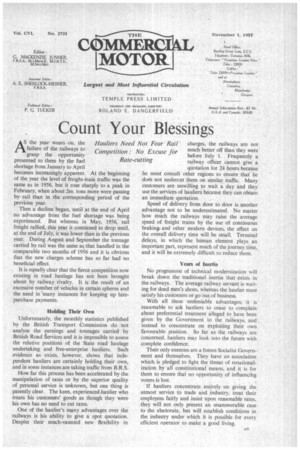Count Your Blessings
Page 43

If you've noticed an error in this article please click here to report it so we can fix it.
Hauliers Need Not Fear Rail Competition : No Excuse for Rate-cutting
Athe year wears on, the failure of the railways to grasp the opportunity presented to them by the fuel shortage from January to April becomes increasingly apparent. At the beginning of the year the level of freight-train traffic was the same as in 1956, but it rose sharply to a peak in February, when about 2m. tons more were passing by rail than in the corresponding period of the previous year.
Then a decline began, until at the end of April no advantage from the fuel shortage was being experienced. But whereas in May, 1956, rail freight rallied, this year it continued to drop until, at the end of July, it was lower than in the previous year. During August and September the tonnage carried by rail was the same as that handled in the comparable two months of 1956 and it is obvious that the new charges scheme has so far had no beneficial effect.
It is equally clear that the fierce competition now existing in road haulage has not been brought about by railway rivalry. It is the result of an excessive number of vehicles in certain spheres and the need in 'many instances for keeping up hirepurchase payments.
Holding Their Own Unfortunately, the monthly statistics published by the British Transport Commission do not analyse the earnings and tonnages carried by British Road Services and it is impossible to assess the relative positions of the State road haulage undertaking and free-enterprise hauliers. Such evidence as exists, however, shows that independent hauliers are certainly holding their own, and in some instances are taking traffic from B.R.S.
How far this process has been accelerated by the manipulation of rates or by the superior quality of personal service is unknown, but one thing is patently clear. The keen, experienced .haulier who treats his customers' goods as though they were his own has no need to cut rates.
One of the haulier's many advantages over the railways is his ability to give a spot quotation. Despite their much-vaunted new flexibility in charges, the railways are not much better off than they were before July 1. Frequently a railway officer cannot give a quotation for 24 hours because he must consult other regions to ensure that he does not undercut them on similar traffic. Many customers are unwilling to wait a day and they use the services of hauliers because they can obtain an immediate quotation.
Speed of delivery from door to door is another advantage not to be underestimated. No matter how much the railways may raise the average speed of freight trains by the use of continuous brakingand other modern devices, the effect on the overall delivery time will be small. Terminal delays, in which the human element plays an important part, represent much of the journey time, and it will be extremely difficult to reduce them.
Years of Inertia No programme of technical modernization will break down the traditional inertia that exists in the railways. The average railway servant is waiting for dead men's shoes, whereas the haulier must satisfy his customers or go out of business.
With all these undeniable advantages, it is reasonable to ask hauliers to cease to complain about preferential treatment alleged to have been given by the Government to the railways, and instead to concentrate on exploiting their own favourable position. So far as the railways are concerned, hauliers may look into the future with complete confidence.
Their only enemies are a future Socialist Government and themselves. They have an association which is pledged to fight the threat of renationalization by all constitutional means, and it is for them to ensure that no opportunity of influencing voters is lost.
If hauliers concentrate entirely on giving the utmost service to trade and industry, treat their employees fairly and insist upon reasonable rates, they will not only present an unanswerable case to the electorate, but will establish conditions in the industry under which it is possible for every efficient operator to make a good living.
























































































































